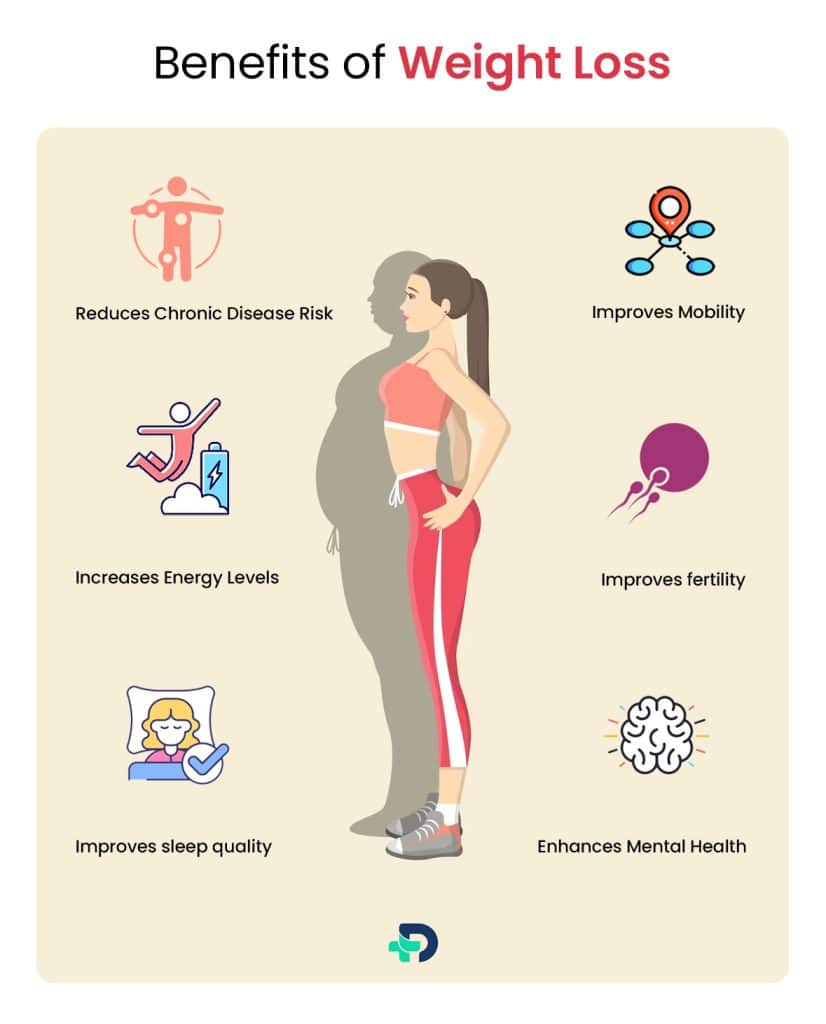Understanding Weight loss: Benefits, Methods and Complications

- Weight Loss
- 22 Aug 2023
Overview
About Weight loss
People worldwide are interested in learning about weight loss for a good cause. Maintaining a healthy weight is essential for your well-being; it’s not about looking good or fitting into your favorite clothes. Losing weight can considerably enhance your physical health, increase self-confidence, and lower your risk of developing several chronic diseases. This article examines the ideal weight for a person who should lose weight, the importance of weight loss, various approaches to losing weight, natural ways to lose weight, and complications of extreme weight loss.

What is an ideal weight?
Depending on a variety of variables, an individual’s optimal weight can vary:
- Age
- Gender
- Body composition 1Overview| Researched based study from Nlm.nih.gov
- Overall health
It is crucial to establish a healthy weight range that supports general well-being rather than just getting to a certain number on the scale.
Need
Who needs to Lose weight?
A few signs, such as the ones listed below, can be used to determine whether someone needs to shed a few pounds:
- Body mass index, or BMI
- Waist circumference
Body mass index (BMI)
- A high BMI may suggest excessive body fat, whereas a low BMI may indicate insufficient body fat.
- Although BMI is a helpful tool, it has certain drawbacks because it doesn’t consider differences in body composition across individuals.
BMI is calculated based on a person’s height and body weight and is as follows:
- Less than 18.5 BMI – Underweight range
- BMI of 18.5 to 24.9 – Healthy Weight range 2Need| Researched based study from Cdc.gov
- 25.0 to 29.9 BMI – Overweight range
- BMI of 30.0 or more – Obese range
Waist circumference
- Measuring your waist circumference is another method for determining your possible disease risk.3Need| Researched based study from Nlm.nih.gov
- Abdominal fat that is too much may be dangerous since it increases a person’s chance of obesity-related illnesses like high blood pressure, Type 2 Diabetes, and heart disease.
These indications are merely screening tools, not medical diagnoses of a person’s health or body fatness. A competent healthcare professional should conduct the necessary health assessment to evaluate a person’s health and dangers.
Benefits

Benefits of weight loss
Weight loss is not just about aesthetics; it plays a significant role in overall health and can be beneficial in the following ways:
- Reduces chronic disease risk
- Improves mobility
- Increases energy levels
- Improves fertility
- Improves sleep quality
- Enhances mental health
Reduces Chronic Disease Risk
- Being overweight raises the chance of developing diseases like heart disease, type 2 diabetes, hypertension, and several types of cancer.
- You can reduce your risk of getting these diseases by decreasing weight.4Benefits| Researched based study from Nlm.nih.gov
Improves Mobility
- Being overweight can stress joints and restrict movement, making daily tasks more difficult.5Benefits| Researched based study from Nlm.nih.gov
Increases Energy Levels
- Losing weight can result in more energy and better physical performance6Benefits| Researched based study from Nlm.nih.gov
Improves fertility
- When obese and PCOS-afflicted women lose weight before receiving fertility medication, it seems to be more beneficial.7Benefits| Researched based study from Nih.gov
Improves sleep quality
- When people lose extra weight, their sleep apnea or insomnia symptoms may improve or disappear.8Benefits| Researched based study from Nlm.nih.gov
Enhances Mental Health
- It might benefit one’s mental health and self-esteem to reach and maintain a healthy weight.
- It has also been demonstrated that losing weight helps ailments like schizophrenia, severe depression, and bipolar disorder.9Benefits| Researched based study from Nih.gov
Methods
Methods of Weight Loss
There are multiple approaches to losing weight and may include:
- Diet
- Exercise
- Behavior modification
- Support systems
Diet
- A well-balanced diet is one of the main ways to lose weight.
- Caloric restriction with a concentration on nutrient-dense meals such as fruits, vegetables, lean meats, and whole grains can result in slow and healthy weight loss.
- The key to success is portion management and avoiding overly processed foods and sugary beverages.10Methods| Researched based study from Mayoclinic.org
Exercise
- A crucial element of weight loss is consistent physical activity.
- Exercises that burn calories and increase muscle mass include swimming, cycling, and other cardiovascular activities.
- Try to work out for at least 150 minutes of moderate effort or 75 minutes of strenuous intensity per week, as recommended by health professionals.11Methods| Researched based study from Cdc.gov
Behavior Modification
- For long-term weight loss, altering food and exercise routines and behaviors is imperative.
- Mindful eating, food diaries, and awareness of eating triggers can aid long-term success. 12Methods| Researched based study from Ucsfhealth.org
Support Systems
- Participating in weight loss programs or getting expert advice from nutritionists and fitness professionals can offer essential support and inspiration during your journey.13Methods| Researched based study from Betterhealth.vic.gov.au
Natural ways
Natural Ways to Lose Weight
The following are some natural methods that can help you lose weight and improve your overall health:
- Set realistic goals – Attempt to lose weight gradually and steadily. Aiming for a weekly weight loss of 1-2 pounds (0.5-1 kg) is safe and achievable. 14Natural ways| Researched based study from Mayoclinic.org
- Portion control – To avoid overeating, be cautious of portion proportions. To control hunger and avoid binge eating, it may be helpful to eat more frequently and in smaller amounts throughout the day.
- Stay hydrated – Drink a lot of water all day long. Water can speed up metabolism, promote digestion, and help with hunger control.
- Avoid crash diets – Extreme eating regimens, including eliminating entire food groups, are unhealthy and unsustainable. Concentrate on developing a wholesome and enjoyable eating schedule.
- Herbal teas – Some herbal teas, including green and oolong tea, have been linked to improved fat burning and may help with weight loss.15Natural ways| Researched based study from Nlm.nih.gov
- Get enough sleep – Sleep affects hormones that control hunger and fullness, so getting enough good sleep is essential for weight management.
- Reduce stress – Doing stress-relieving activities like yoga, meditation, or deep breathing can help. High levels of stress have been linked to impulsive eating and weight gain.
- Maintain a food journal – keeping track of your caloric intake will make you more conscious of your eating patterns and help you spot areas where you can make changes.15Natural ways| Researched based study from Nlm.nih.gov
- Join a weight reduction support group – or consult a nutritionist or dietitian for advice, encouragement, and accountability.
- Be persistent and patient – since losing weight takes time and work. Maintain healthy routines, and don’t let a few slip-ups get you down.
Complications
Weight loss Complications
Rapid weight loss may seem appealing to some, but realizing that such methods can harm your well-being and may not be maintainable over the long run is vital.
Here are a few complications and adverse effects related to rapid weight loss:
- Nutritional deficiencies
- Weakened immune system
- Muscle loss
- Gallstones 16Complications| Researched based study from Niddk.nih.gov
- Dehydration
- Electrolyte imbalances
- Irregular heart rhythms
- Hair loss or thinning
- Fatigue and weakness
- Irregular menstruation
- Decreased libido
- Decreased Bone Density 17Complications| Researched based study from Nlm.nih.gov
- Risk of fractures
- Osteoporosis
- Anxiety
- Depression
- Eating disorders
- Rebound Weight Gain
- Other heart problems
Takeaway
Takeaway
Commitment, tolerance, and an emphasis on long-term objectives are necessary when beginning a weight loss journey. Making long-lasting, healthy lifestyle adjustments is essential for sustained weight loss, which happens gradually. Remember that every person has a unique body, so what functions well for one person may not be effective for another. Pay attention to your body’s signals and implement modifications that fit your tastes and lifestyle. Before beginning any weight loss program, always speak with a medical practitioner to be sure it suits your requirements and current state of health.
Any feedback on this article?
 This Articles content was accurate
This Articles content was accurate Very Informative Article
Very Informative Article I have a question or a comment
I have a question or a comment
 This article contains inaccurate content
This article contains inaccurate content This article was not helpful
This article was not helpful I have a question or a comment
I have a question or a comment
We appreciate your helpful feedback!
Checkout our social pages
References
-
National Library of Medicine
Age- and sex-related differences in body composition in healthy subjects aged 18 to 82 years | Overview
-
Centers for Disease Control and Prevention
Assessing Your Weight | Need
-
National Library of Medicine
Measurement of Waist Circumference | Need
-
National Library of Medicine
Weight Loss and Improvement in Comorbidity: Differences at 5%, 10%, 15%, and Over | Benefits
-
National Library of Medicine
Lifestyle Change and Mobility in Obese Adults with Type 2 Diabetes | Benefits
-
National Library of Medicine
Changes in Energy Expenditure with Weight Gain and Weight Loss in Humans | Benefits
-
National Library of Medicine
Weight loss before fertility treatment may improve pregnancy odds for women with PCOS | Benefits
-
National Library of Medicine
Weight Loss Is Integral to Obstructive Sleep Apnea Management. Ten-Year Follow-up in Sleep AHEAD | Benefits
-
National Institutes of Health
Weight Loss in People with Serious Mental Illness | Benefits
-
Mayo Clinic
Healthy Lifestyle Portion control | Methods
-
Centers for Disease Control and Prevention
Physical Activity for a Healthy Weight | Methods
-
UCSF Health
Behavior Modification Ideas for Weight Management | Methods
-
Better Health Channel
Weight management services | Methods
-
Mayo Clinic
Weight loss: 6 strategies for success | Natural Ways
-
National Library of Medicine
Effect of Green Tea on Anthropometric Indices and Body Composition in Patients with Type 2 Diabetes Mellitus: A Systematic Review and Meta-Analysis | Natural ways
-
National Institute of Diabetes and Digestive and Kidney Diseases
Dieting & Gallstones | Complications
-
National Library of Medicine
Effect of diet-induced weight loss on total body bone mass | Complications




































